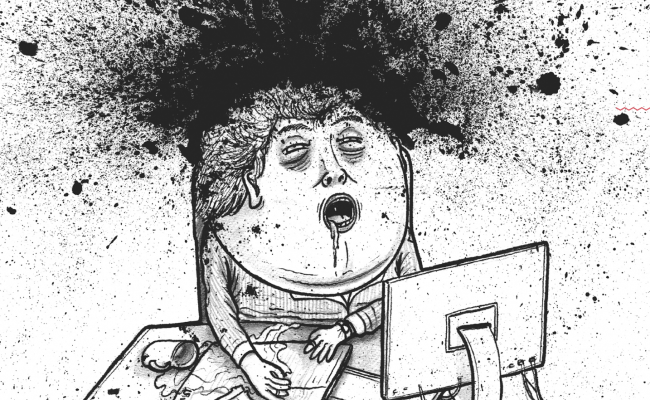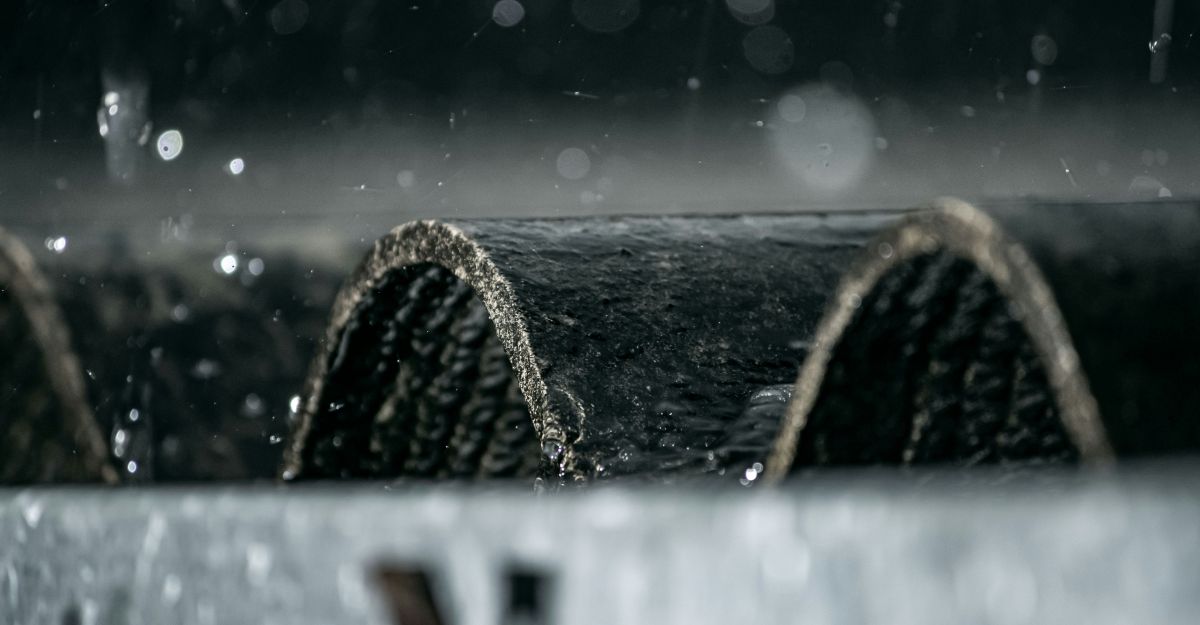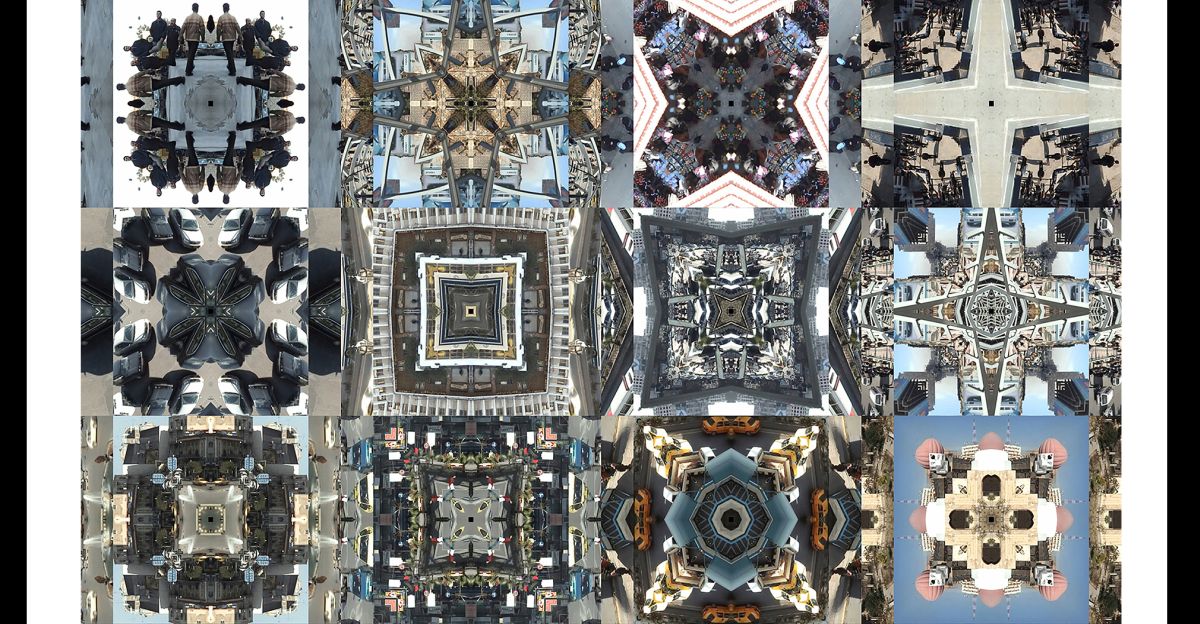They are clouds or they are leaves. They hang in bunches over my head and the leaves rain down and the grass is green and wet with them. They are dark and their gloom is like a fish that has swum its life staring at the water and at nothing. ‘Kick’ you might have told me, ‘kick kick kick,’ but there is oil in the water, there is so much silt that the water is groaning with the load, every droplet painted the same shade of mud.
I have been without any work for a long time and the listless days are heavy for being so bare: days when I’ve carved no steps into the story’s pages, days when I’ve annotated no clocks, written no words above the straight lines of minute hands and hours.
For two years I have been applying for jobs, contemptuous jobs that purse up their lips and turn sharply from my pleas, jobs that fold up their arms and stare me down and send me back to the slums of disappointment and misery with a slowly stretching finger, pointing me along the chipped road to my overgrown underground flat with its dirt-brown carpet and dirt-dirt walls. If these jobs had feet and their feet had boots they would stamp me down in the dust. If these jobs had hearts they would reach down with their hands (if these jobs had hands) and they would pick me up and they would hold me and stroke my soft and wilting hair as they told me that it simply couldn’t be, but that they felt for me – oh how they felt for me – and they were so sorry, but they just couldn’t, and you just couldn’t, and the bedclothes were cold, they were always so cold.
These are not just any jobs; they are starlets and celebrities that put on a dance number in the middle of a street with its cars all agape and its jaws dropping down along the pavement in the domino breeze. Striding in unpatched jeans, I bypass the window offers in the cafes and bars, the newspaper columns seeking chefs and managers and qualified precision. But no. I have set my sights higher and I am certain that the odds will play out in time. For I am only applying for jobs that have been advertised in The Economist.
This week I applied for the Director (Budget) in the Division of Financial Management at UNICEF. I’m determined to make something of myself, for then you would see my photograph in serious weekly papers and note that I am a man who can weigh and calculate important matters, a man others look to for guidance and judgement, and you would knock on my door and you would fling me open and we would cry till the day was pencilled in evening shades, until finally I would be dragged away by the very tip of my immaculate tie to meetings in twelve-star hotels and champagne glasses and ballistic missiles, and you would be there applauding me as though I were walking on to a stage to receive a prize.
But – and it is late at night, the darkness has brought us a little closer, for who can say whether or not you are sitting across from me in this deep ocean of evening – there is one small thing that I fear. Do you know what it is? I fear that one Friday morning, as a small wave of wakefulness flushes me from my bed and I shuffle into my kitchenette to coax at the kettle’s poor spirits, I will slump down with my phone at the Nullarbor bench where I’ll thumb through my emails, and there amid the messages that I have read and not read and left to prick at my administrative conscience, there will be one that seems a little more embossed or bordered in gold, and this message will proudly proclaim that I’ve been chosen to be the director of a major financial or perhaps environmental institution; that they’ll ship me off to Paris or Brussels where they will measure my arms and legs for that suit and tie, and they’ll hand me a brown leather briefcase holding many papers in cream yellow folders and an electronic device that fits into my ear. And I will sit down in my office and pick up the phone, and all day, all week and all year that phone will usher in subordinates who will ask me what we are going to do with that forest and this village and that mango and this child’s face, until one night I will look at my watch and it will be time to hang up and I will hurry out to my limousine which is the full length of a city block, and I’ll be carried off to another ancient city of gleaming steel. I’ll be escorted to the most prominent of its crystalline buildings and carried to its peak, where I will meet other people in positions of power and prestige, and ‘Bill,’ one will be saying, ‘I’m so glad to meet you’ (and this will be the director of a hedge fund the size of Malaysia’s economy) and for the briefest of moments I will look at all those pillars of people who have been built from the city and are part of the city and are holding the city together, and I will feel like a thin and insubstantial interloper sidling in to steal the sea-blue cheeses, and – as though the chandeliers are scattering honesty through the room in a thousand fillets of light – ‘you know,’ I will say, fiddling with the twig stem of my glass, ‘Harry, it’s really good to meet you too, but I have to admit that I kind of wonder … just last week I was sitting in my Moonah flat with its tyres stolen and the windscreen cracked, ironing my one good shirt and watching A Current Affair, and now here I am, making these decisions that change the very angles of the earth. Doesn’t it feel that something doesn’t quite add up?’
And perhaps the light’s effect is universal, perhaps it will have an old-fashioned way of unspooling the truth, for Harry will reach a finger to his throat and adjust his collar as though it is part of a costume or shell, and he will look from side to side at all the bustling eminence and then he will lean in towards me, and ‘You know,’ he’ll whisper, ‘We’re all like you. We’re all exactly the same. Don’t worry about any of that.’
And this is what I fear: as I shake his trembling hand and then sidle over to look through the vast window at the city hurtling with glowing clouds, that I will look for you, there, among all the glowing lights that hurry around me, and I’ll not be able to see your face at all.
Read the rest of Overland 235
If you enjoyed this piece, buy the issue




